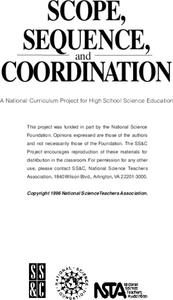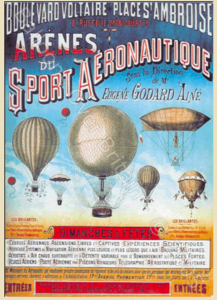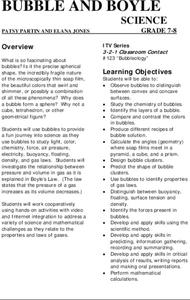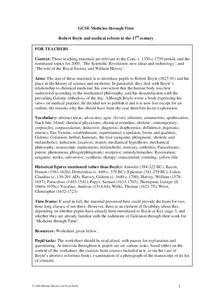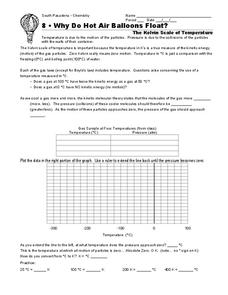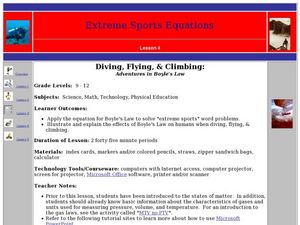Kenan Fellows
Sensors in Chemistry
The Environmental Protection Agency monitors sensors to track air pollution and set clean air standards. Enthusiastic young scientists use similar sensors to gather data in their area and then apply the gas laws and conservation of...
College Board
AP Physics 1 and 2 Inquiry-Based Lab Investigations
Have you ever wondered what type of AP Physics investigations The College Board wants? This is the guide for you! Sixteen labs covering both Physics I and II will get you started and inspire you to meet the requirement of 25 percent of...
CPO Science
Physics Skill and Practice Worksheets
Stop wasting energy searching for physics resources, this comprehensive collection of worksheets has you covered. Starting with introductions to the scientific method, dimensional analysis, and graphing data, these skills practice...
Texas State Energy Conservation Office
Investigation: Gas Laws in Action - Propane
Using helium as an example of propane, physical science middle schoolers experiment with and graph the relationship between temperature and volume in gases. In a whole-class demonstration, they show how molecules behave under different...
Curated OER
Gas Laws
A series of attention-grabbing demonstrations and lab activities is outlined in this document. Through them, chemistry kids appreciate the behavior of gases. Inflate balloons, marshmallows, and toothpaste tubes without adding air! Use...
Curated OER
Properties of Matter
This PowerPoint is a gem! Seventy-eight slides present an entire introduction to matter in bullet-point fashion. Viewers learn about everything from mass and inertia to phase changes and gas laws! The only glitch is that the links to...
Pingry School
Gas Pressure and Volume Relationship
Do your high school scientists know the four methods scientists use to communicate information? A simple experiment discovering the relationship between gas pressure and volume allows pupils to practice all four. After completing the...
Chymist
Pressure-Volume Relationships: Experiments with 140-mL Syringe
Learners examine Boyle's Law by analyzing experimental results with a hands-on lesson that provides a set of four experiments that illustrate the relationship between pressure and volume of gases. Groups analyze results using...
PHET
Gas Properties
We can't see most gases and we can't see things at the molecular level — but that's about to change! A simulation shows pupils the activity of molecules in a gas. The simulation allows scholars to vary the volume, heat, and...
Science Geek
Gas Laws
A physical science presentation begins with an explanation of ideal gases and their behavior. Then it introduces all of the gas laws with descriptions and formulas.
Steinhardt Apps
Kinetic Molecular Theory
Building off young chemists' knowledge of the states of matter, kinetic molecular theory is the focus of the unit. Eight days of lessons including multiple demonstrations, one lab experiment, directed instruction, and worksheets,...
US Navy
The Science of Diving
Introduce gas laws using the popular topic of SCUBA diving. This activity makes a connection between the gas laws and the effect of pressure and temperature changes during diving. Young engineers complete introductory experiments to...
Curated OER
Gas Pressure and Volume
A class might find this presentation complicated at first, but with your explanations would understand the relevancy of the diagrams included. An animnated plunger shows the change in pressure on a gas and makes the reasoning behind the...
Curated OER
Bubble and Boyle
Middle-schoolers still enjoy playing with bubbles! In this series of eight laboratory activities, science learners explore convex and concave surfaces, angles, gas laws, buoyancy, density and more!
Curated OER
States of Matter
Although the title is States of Matter, this presentation is a collection of 4 slides just dealing with gas particle behavior, pressure and the Laws of Boyles and Charles and Gay-Lussac.
Mr. E. Science
Changes in Matter
Do solids, liquids, and gases even matter? The presentation focuses on changes in matter, including phases, Boyle's Law, Charles' Law, and physical changes.
Michael Hunter and Fiona Kisby
Robert Boyle and Medical Reform in the 17th Century
Introduce pupils to the work of Robert Boyle and his influence on medical practice through a series of informational texts and discussion questions.
Curated OER
Boyle's Law
After viewing this PowerPoint, physical science learners will be able to apply Boyle's law. Background information, reasoning, and data will help in understanding the behavior of gases. There are a few slides that require pupils to...
Curated OER
Boyle's Law and Charles's Law
In this gas laws learning exercise, students complete 11 fill in the blanks and problem solving questions on Boyle's and Charles's laws.
Curated OER
It's the Law
Students explain various scientific laws used in SCUBA diving. For this theory based lesson, students examine and explain how temperature, density, and salinity relate to SCUBA diving using various scientific laws to engage their learning.
Curated OER
Why Do Hot Air Balloons Float?
In this Boyle's Law worksheet, students solve eight problems using the inverse relationship between the volume of a gas and the pressure of a gas at a constant temperature.
Curated OER
Boyle's Law
In this Boyle's Law worksheet, high schoolers investigate the relationship between the pressure and the volume of a gas at constant temperature. They use a syringe and a pressure gauge attached to a computer to collect their data. They...
Curated OER
Why Do Hot Air Balloons Float?
In this gases learning exercise, high schoolers read about the Kelvin scale of temperature, they answer 3 fill in the blank questions about the relationship between temperature and pressure and they plot the temperature and pressure of...
Curated OER
Diving, Flying, & Climbing
High schoolers explore Boyle's Law. In this Boyle's Law lesson, students complete problems involving Boyle's Law. They examine the effects of Boyle's Law upon the human body. High schoolers use the Internet to complete a lab activity.






